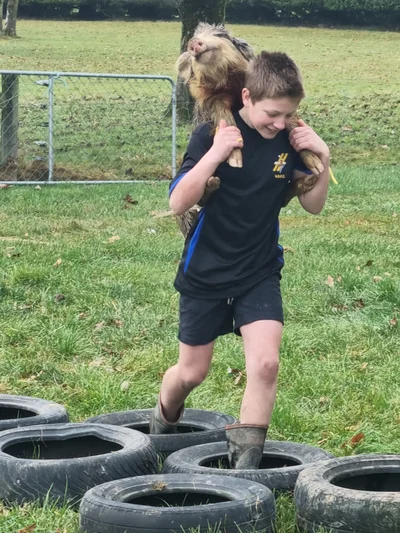Cats back at hunting competition

The North Canterbury Hunt Competition (NCHC) is back this Matariki weekend on June 28-30 in Rotherham with the feral cat category firmly in place.
Last year’s event was the biggest hunting competition in New Zealand, with a total of 1518 entries, which included 409 in the junior section.
243 cats were culled as part of the junior section of last year’s event.
The competition sparked backlash last year from animal welfare groups, with activists from Christchurch Animal Save protesting at the event weigh–in, allegedly calling children who had entries in the feral cat category ‘murderers’.
NCHC organiser Mat Bailey says everyone has their perspective, and he welcomes the protesters.
“I hope they come because that’s what brings the crowds.
“It made my day, with everyone here, especially the old timers with protesters in the Amuri Showgrounds; they just thought it was hilarious.
“Everyone loved it, so bring it on.”
Christchurch Animal Save organiser Sarah Jackson said the group plans to protest at the event again this year if they can get enough volunteers.
“We would like to see non-lethal methods taken when dealing with our introduced species because they are victims of colonisation,” Jackson said.
“It’s not their fault they are here, but they are here now.”
Jackson said that the threat feral cats impose on native wildlife doesn’t justify hunting them and that non-lethal methods like neutering and relocating would be a more humane option.
“To prioritise animals that were here previously, and that we hold more value to, is not really fair.”
Society for the Prevention of Cruelty to Animals (SPCA ) scientific officer Dr Christine Sumner says that the SPCA acknowledges that feral cats are considered a pest under New Zealand law but is opposed to methods (of killing) that don’t result in a humane death.
“SPCA advocates that feral cat management is done by people who have experience and are confident in their abilities to humanely manage cats, engage with the local community about management activities, and use the most humane methods of lethal control where this is deemed necessary,” Sumner said.
“Humane methods are those that lead to the quickest death with the least amount of suffering.”
Sumner expressed concern that hunters may be unable to differentiate between domestic and feral cats.
“SPCA is concerned not everyone can tell the difference between a trapped feral, stray or a frightened companion cat based on appearance and behaviour.
“Managing feral cats as part of a competition may lead to less humane treatment of feral, stray and companion cats.”
This year, the feral cat section will be open to all ages, with a prize for the biggest feral cat.
The winner will receive a taxidermy trophy of a black feral cat.
Other prizes up for grabs at the event include a 2010 Toyota Hilux as spot prize for an open hunter and a Honda motorbike for a junior hunter.
The 2023 NCHC event weighed in a total of 379 animals in the open section: 142 deer, 231 pigs and six chamois, and event organisers hope the event will continue to grow.
Last year’s event saw Hunter for Hope process 50 deer into mince and back steaks from the competition, which was donated to the Hope Community Trust and distributed to local food banks, providing around 4500 meals for those in need.
Bailey said the competition is looking to partner with Hunters for Hope again at this year’s event to provide more venison for food banks.
Proceeds from the hunt will go back into the Rotherham community, supporting the school and local pool.
The school will host a barbecue on the day, and there will be a coffee cart, food truck and a lolly scramble to keep children entertained.
by Claire Inkson

